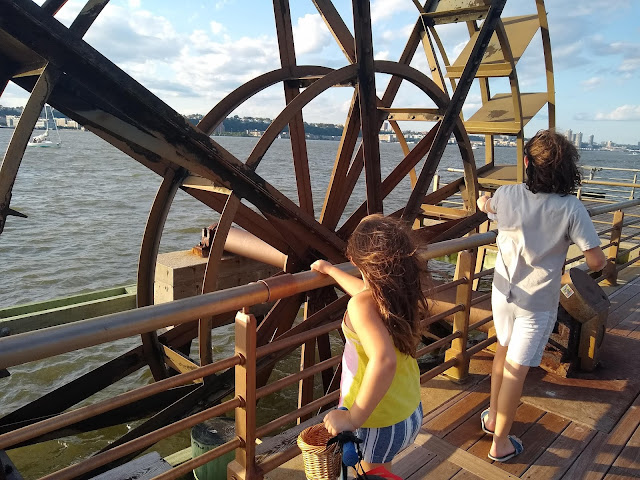In Defense of Lemonade Stands
A few weeks ago I was at a farmer’s market trying to have one of those
small-town peaceful experiences, drinking coffee and eating a bagel on a Sunday
morning in late June. My mom was asking me to hold her coffee and Wally was dropping his bagel and there was a bit
of anxiety at first over the chairs—the one I was sitting on was being eyed by the
landscape artist selling his rural landscape paintings. I was trying to ask
him, pointing to my chair, mouthing the words...Is this yours? and he just looked back at me with an irritated face like What are you saying?. Wally was handing me stuff like a
water bottle and sunscreen and along come two kids,
a girl and boy, maybe about 7 years old, asking if you want to buy cake pops Oreo with sprinkles brownie chocolate
chip homemade marshmallow pops… They’re slurring their words and holding out a
box…clearly selling something, hard to see what under all this bunched-up wax paper.
I kind of felt on the spot, there, can't say no, and it is a nice even though it's kind of like one more thing and I still didn't know if I needed to relinquish the chair. So my mom and I were both reaching for our wallets in a kind of distracted, maybe harried, way, when the
girl said, “We’re raising money for a woman with cancer on our street” and
we’re both like, “Oh, why didn’t you say that in the first place? Then of course" and we picked out a few different treats.
The kids moved on, approaching other strangers,
many of whom gave them the brush-off. It always sort of bothers me when people say, “No I don’t want any” to kids
selling lemonade when the point isn’t whether you want it or not. No one really
wants a half a plastic cup of crappy lukewarm lemonade from made a mix with not
enough mix.
But in the past I’ve mostly said yes to kids selling lemonade or homemade cookies because I want to be nice, and, less nobly, because I feel awkward saying no. Since I've been thinking more about Robert Putnam's ideas for re-building communities lately, it now seems obvious that something as simple as buying a 50 cent lemonade from a local kid supports that goal, in however tiny a way. We really should patronize these kinds of efforts regardless of whether they fall into the category of fundraising for a good cause or just stuffing the coiffeurs of already rich kids so they can buy more plastic toys made in China (though of course it’d be great if that’s not what they do with it).
At the farmer's market, the kids had walked over by themselves from a nearby street. A sight that was commonplace a generation ago (kids walking around by themselves) is now pretty rare, so that in itself is remarkable and worth encouraging. Plus it's not easy to walk up to strangers, no matter how cute you are. The kids were shy and obviously a bit nervous. They were pushing themselves outside their comfort zone to participate in the community a little bit. Adults--especially the ones complaining about how kids don't say hello or make eye contact anymore--should reward that.
I asked a friend about it a few days later, as I pulled to the side of the road to buy lemonade from a couple of preteens in front of a giant brick house. She said (privately to me) that she tends to ignore these sorts of ventures, thinking, why should I give money to these rich kids?
But even if they are rich, that good fortune, like the crappy lemonade, isn't really the point. Kids sitting outside in the hot sun waving at passersby all day with hopefully a card table and handwritten sign rather than a $280 lemonade stand, is really kind of a cool thing. First, they are working, so even if they end up keeping the money and their families don't need it, they did earn it, which is better than being handed it. If they're lucky their parents will insist they get reimbursed for supplies, so they'll get a real life lesson about profit. Plus they're doing something on their own, without too much parental oversight. And they are spending time outside. They're greeting people. They're taking part in the community, helping to reverse the trends described by Robert Putnam in Bowling Alone where he writes: "Weakened social capital is manifest in the things that have vanished almost unnoticed--neighborhood parties and get-together with friends, the unreflective kindness of strangers, the shared pursuit of the public good rather than a solitary quest for private goods."
Kids working lemonade stands are facing rejection--the many people who pass or drive right by without so much as a wave. In the world governed by hyperparents afraid to let their kids feel even the slightest disappointment (and therefore never letting them learn how to deal with it), this is important too. Suppose the kids spend hours out there and come home with two pitchers still full to the top of that crappy lemonade? That's okay, too. Part of childhood, the prevailing parenting style seems to have forgotten, is learning to deal with not getting what you want. Being handed lemons, so to speak.
But hopefully lots of neighbors will stop and say hello and feel awkward taking back fifty cents but also wonder if it's weird to leave it there as a tip and if that undermines the real-ness of what the kids are doing (or maybe that's just me...) and happily slurp back the nice little cup of lemonade.
Either way, here are these little kids tearing themselves away from from the siren call of organized sports and video games to carry on a simple tradition passed down from generations. Among the cars racing by, the rushed passersby spilling their coffee, the disconnection and isolation of suburban sprawl or in the quiet of empty urban streets where kids are no longer kick cans or sit on stoops, these resilient kids are hoping to create one little part of a little village, trying to uphold their part of a social contract, with a rickety table and a handwritten sign.



There are so many positives about kids raising money for those kids selling the treats to raise money for the woman in their street who has had cancer.
ReplyDeleteWorking together, feeling empowered to help others ( even tho' they are only 7 years old), making something, stepping outside of their comfort zone, and a sense of accomplishment.
Yes! So true when kids are fundraising like these kids were. (And at another point we saw two boys raising money for a school. We thought it was simply an affluent local school (which is okay, too), but they explained it was an impoverished school in Nicaragua. I really wanted to take a picture but with all the insanity around pix of kids I felt like I couldn't.
ReplyDeleteYou've made me realise that I don't buy stuff from kids often enough. You've made me realise it matters. So I shall buy the next squishy muffin when I see it.
ReplyDeleteI'm so glad Vanessa!
ReplyDeleteI've changed my view on it too...it used to be more that I felt like I had to, and then I started thinking about all these points above and how important it is for adults in the community to support kids who are bucking the trends of being glued to the computer or caught in the swell of organized, adult-supervised activities. Otherwise why would the kids continue to try to be out there? Plus we all seem to want kids to be a little more polite and friendly, so why not make them feel that adult strangers are (for the most part) friendly people, too?
Anyway, so glad to hear I've changed your mind. (My initially skeptical friend has too.) Squishy muffins!! Yay!
i like the new font! (up top where it says last american childhood). kind of brady and fun :)
ReplyDeleteThx Bearette! As you can tell, I'm so horribly incompetent when it comes to even the simplest design...I'm always trying to get the blog to look semi decent and reasonable and I can't seem to even manage that. Even post to post the fonts keep changing.
ReplyDeleteI also would love to know how people put at the bottom of their posts "You might also like..." -- It's some kind of widget where you can add the code I guess. Anyway - THANKS for letting me know you like the new title font. Maybe some day this won't look like so 1994 (or if it does, it will be deliberate/retro)
Are you taking part in the Where's Waldo hunt? http://www.nydailynews.com/new-york/waldo-25th-anniversary-spurs-book-character-hunt-dozens-indie-businesses-manhattan-brooklyn-queens-article-1.1110267
ReplyDeletecommercialism, yes, but community building, supporting local, and my 3 year old is loving it.
and let's be honest- I;m loving it too. takes me bacj to my 8 year old self. we bought him a Where's Waldo book, and he's spent HOURS scouring it.
ReplyDeleteSo here's a question for you- do you buy (or feel as compelled to buy) the peanut M&Ms from the kids on the subway?
ReplyDeleteHi Holly - I didn't know anything about the Where's Waldo hunt? Thank you for pointing me in that direction - - going to look it up now...YES! I do feel equally compelled to buy the peanut M&Ms on the subway -- great question -- but I often find myself scrounging in my backpack for my wallet but trying not to make a show of it and then they've pushed through to the other end of the car or I have to get off by the time I surface with a dollar. All part of that rush rush aspect of living in the city. The kids hawking M&Ms have the advantage of numbers but disadvantage of time compared to most kids hawking lemonade. I should, when I think about it, have a few singles ready at all times in an outside pocket for that kind of thing. I have to admit, tho, it doesn't give you that same community feel, as in the subway it can feel like one more case of overstimulation, generally adding to the confusion and easier to block out. I'm glad you compared the two...they are stylistically very different but in essence the same thing.
ReplyDeleteDid anyone see this? "Insure your child's lemonade stand?" on MSN
ReplyDelete"From lemonade stands to dog-washing operations, summer businesses give youngsters the chance to learn the value of a hard-earned dollar. But as any entrepreneur knows, things can go awry with even the best-laid business plans.
What if your junior landscaper kills the neighbor's rare azaleas? Or your little peddler's lemonade turns stomachs sour? Know what your little CEOs are up to -- and check your home insurance policy.
Typically, home insurance provides just $2,500 in coverage for business-related property, and excludes business activities from liability coverage" read the whole thing..